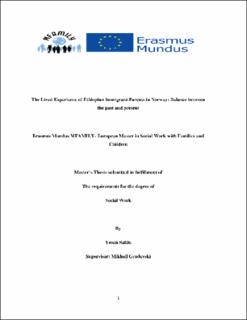| dc.description.abstract | Background: Families endure changes to responsibilities upon migration regardless of the type of society they are integrating into. In an effort to fit into the new culture and social order, immigrant families encounter challenges however; the comprehensive welfare system in most Western societies will serve as a resource and opportunity for both native citizens and immigrants.
Objective: The objective of this study is to gain new knowledge about the lived experience of Ethiopian immigrant parents in Norway and the influence of the past context on their current parental behavioral practices.
Method: The research questions of the study are designed in a way that can be best answered and explained by qualitative research method; therefore the study is qualitative. The study is based on the analysis of semi-structured interviews with four Ethiopian immigrant parents who live in the western part of Norway. With the aim of selecting participants that are pertinent to the study topics, non-probability purposive sampling was used. A phenomenological research design was employed, and the results of the study were analyzed using an Interpretative Phenomenological Analysis (IPA).
Research Questions: The following research questions were designed to address the objective of the study. What are the experiences and challenges of Ethiopian immigrant parents in relation to parenting? How do Ethiopian immigrant parents living in Norway reflect on the differences in parental practices in the two countries? How do Ethiopian immigrant parents’ parental behavioral practices are being influenced by their past and present cultural contexts?
Findings: In terms of challenges, language, overburden on parents, fear of being not good enough, and limited power of parents over their children were discussed by the Ethiopian immigrant parents. In terms of opportunity, exposure to a new culture, better standard of living, and support from the welfare state was reflected upon by the participants.
Conclusions: The study concluded that with a regulation of the past and present life, it is possible to make the influence of the past context on the present parental behavioral practices positive and rewarding.
Recommendations: Based on the result and findings of the study, it is recommended that local citizens and the state play an imperative role in easing the challenges of immigrants parents, as the challenges of immigrants are always related to the community or the state. | |
